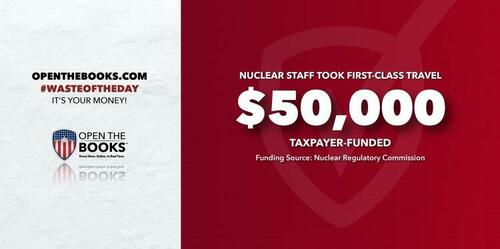Authored by Jeremy Portnoy via RealClearInvestigations,
Topline: A recent inspector general audit of the Nuclear Regulatory Commission’s travel expenses found a slew of waste and potential fraud, including nearly $50,000 in unallowed first-class flights between 2020 and 2023.
Key facts: Federal law requires most government employees to fly economy class, with exceptions made for medical or security concerns. To fly first class, employees must submit a written explanation and obtain approval from their supervisor.
Workers at the commission only had proper approval for four of the 19 first-class flights that auditors reviewed. In one instance, an employee paid $12,535 for first class when a $1,134 business-class ticket was available
Some of the first-class trips were approved by employees who had no authority to do so, according to the audit. Others had no justification.
The commission also failed to remove access to travel charge cards for 37 employees that no longer work for the government. Auditors did not find any former employees who used their charge cards, but said there was a “risk” it could have happened.
Federal law requires that charge cards have credit limits of $10,000 to minimize spending and financial risk. Auditors found three commission cards with limits of up to $20,000, with no written explanation for the increase.
The Nuclear Regulatory Commission’s agency-wide credit limit for travel also may be “too high,” increasing the risk for fraud, auditors said. The commission spent an average of $358,190 on travel each month last year, but is technically allowed to spend $5 million in a single month.
The audit found three transactions on charge cards totaling $9,593 that appeared to be for items unrelated to government business, though further review is needed to confirm the “potential misuse.”
In total, employees put 161,816 charges worth $27 million on their travel charge cards from 2020 to 2023. Almost half of the transactions came last year.
Federal law requires employees to take a refresher course on charge card spending at least every three years. The NRC made the training voluntary and did not track attendance, auditors found.
Search all federal, state and local government salaries and vendor spending with the AI search bot, Benjamin, at OpenTheBooks.com.
Summary: It’s a bit worrying that the agency tasked with ensuring the safety of nuclear reactors can’t handle the simple process of booking a flight.
The #WasteOfTheDay is brought to you by the forensic auditors at OpenTheBooks.com
Authored by Jeremy Portnoy via RealClearInvestigations,
Topline: A recent inspector general audit of the Nuclear Regulatory Commission’s travel expenses found a slew of waste and potential fraud, including nearly $50,000 in unallowed first-class flights between 2020 and 2023.
Key facts: Federal law requires most government employees to fly economy class, with exceptions made for medical or security concerns. To fly first class, employees must submit a written explanation and obtain approval from their supervisor.
Workers at the commission only had proper approval for four of the 19 first-class flights that auditors reviewed. In one instance, an employee paid $12,535 for first class when a $1,134 business-class ticket was available
Some of the first-class trips were approved by employees who had no authority to do so, according to the audit. Others had no justification.
The commission also failed to remove access to travel charge cards for 37 employees that no longer work for the government. Auditors did not find any former employees who used their charge cards, but said there was a “risk” it could have happened.
Federal law requires that charge cards have credit limits of $10,000 to minimize spending and financial risk. Auditors found three commission cards with limits of up to $20,000, with no written explanation for the increase.
The Nuclear Regulatory Commission’s agency-wide credit limit for travel also may be “too high,” increasing the risk for fraud, auditors said. The commission spent an average of $358,190 on travel each month last year, but is technically allowed to spend $5 million in a single month.
The audit found three transactions on charge cards totaling $9,593 that appeared to be for items unrelated to government business, though further review is needed to confirm the “potential misuse.”
In total, employees put 161,816 charges worth $27 million on their travel charge cards from 2020 to 2023. Almost half of the transactions came last year.
Federal law requires employees to take a refresher course on charge card spending at least every three years. The NRC made the training voluntary and did not track attendance, auditors found.
Search all federal, state and local government salaries and vendor spending with the AI search bot, Benjamin, at OpenTheBooks.com.
Summary: It’s a bit worrying that the agency tasked with ensuring the safety of nuclear reactors can’t handle the simple process of booking a flight.
The #WasteOfTheDay is brought to you by the forensic auditors at OpenTheBooks.com


